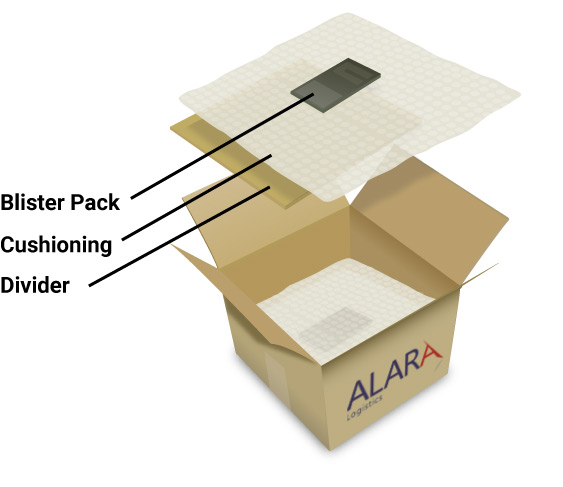Lithium-Ion Batteries
The same technologies that deliver superior performance and reliability to your cell phones, laptops, toys, medical devices, and cameras, also present unique hazards for shippers, carriers and receivers. Because of significant incidents involving fires in transportation, regulations around the world are being changed to improve the safe transportation of lithium batteries. ALARA Logistics is the expert in keeping on top of the constantly-changing regulations, ensuring these regulations are met, and keeping your mind at ease when shipping your precious lithium batteries.
ALARA Custom Packaging

As of January 1, 2016, updated regulations specify that strong rigid packaging must be used for batteries that are shipped alone or in or with equipment when meeting the requirements of Section II of Packing Instructions 965, 966, 967, 968, 969, and 970. The packing instructions also specify acceptable materials for such packaging (e.g., fiberboard boxes, plastic drums).
Furthermore, in 2017, FedEx restrictions will be implemented, making lithium-ion battery shipments even more difficult. These restrictions include:
- Lithium batteries (UN3090 and UN3480) meeting Section II requirements under IATA will NO LONGER BE ACCEPTED by FedEx Express.
- There are new marking and labeling requirements for UN3090 and UN3480.
- NEW Training Requirements
- More fees and Approvals
ALARA’s custom packaging meets or exceeds all shipping requirements to ensure your batteries are packaged to meet all regulations.
Non-Compliance is far more expensive than proper logistical execution

Civil lawsuit penalties up to $168,000 have been filed by the FAA for non-compliance of lithium battery shipments.
- In March 2015, the FAA alleged that China Express International offered a single lithium-ion battery pack for air transportation to United Airlines. The agency is seeking civil penalties in the amount of $82,500 for the alleged violation.
- In June 2015, the FAA proposed a civil penalty of $63,000 against CTC Battery for offering an undeclared shipment of four 12.8V rechargeable lithium-ion phosphate batteries to UPS for air transportation. FAA alleged that the shipment was not accompanied by shipping papers indicating the hazardous nature of the contents. In addition, CTC Battery allegedly failed to provide emergency response information and did not ensure its employees received hazardous materials training.
- In November 2014, the FAA proposed a $168,000 civil penalty against MedStar Health for allegedly violating the Hazardous Materials Regulations when it offered a box containing 180 lithium-ion batteries to FedEx for shipment by air. According to the FAA, the batteries were improperly packaged in a plastic bag that was not sufficient to prevent the batteries from short-circuiting. FAA alleged that MedStar failed to declare the hazardous materials and did not label the package for cargo aircraft only. MedStar also did not provide emergency response information with the shipment and failed to ensure its employees received training for shipping hazardous materials.
